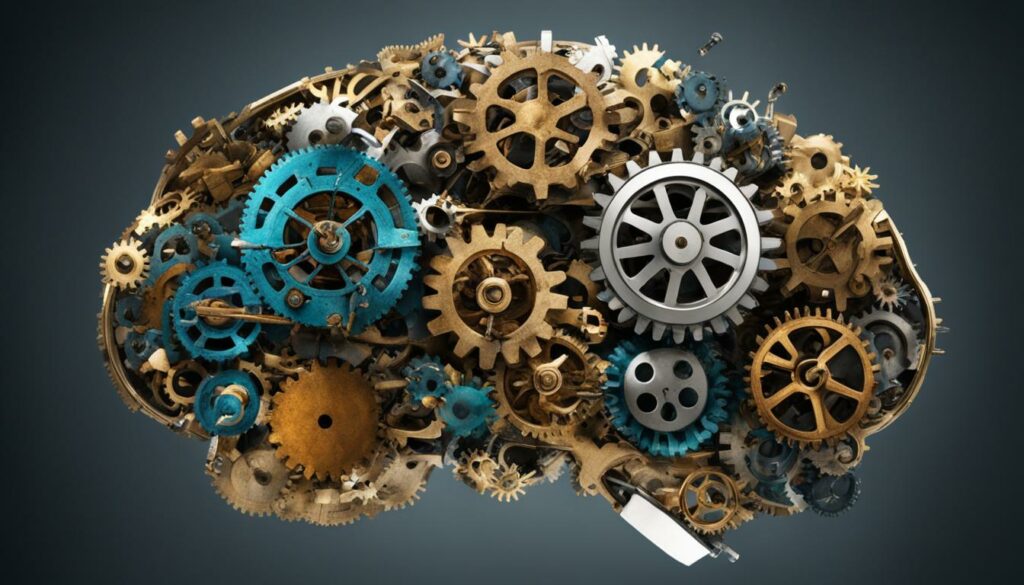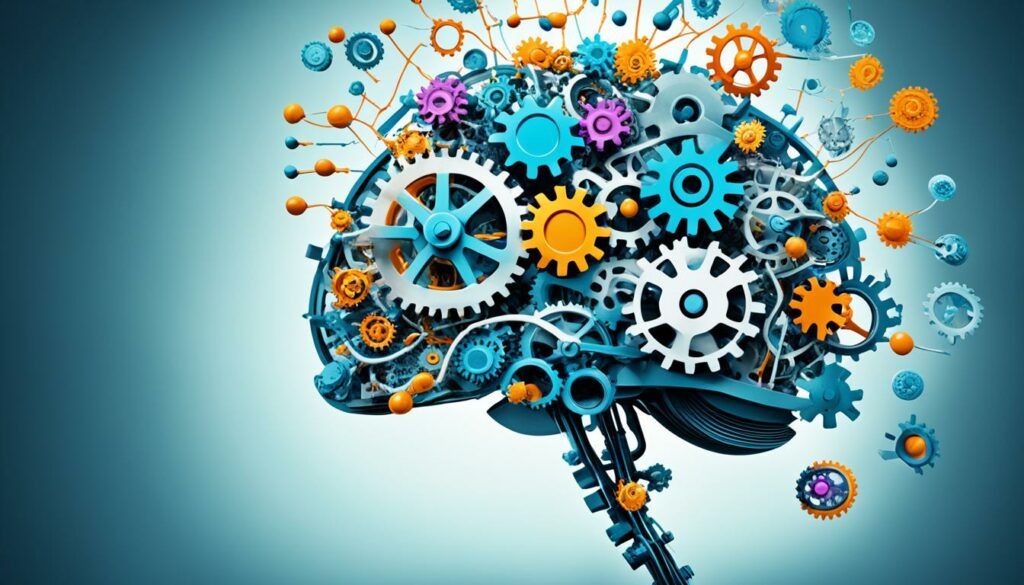Did you know that ADHD affects approximately 6.1 million children in the United States alone? This neurodevelopmental disorder can have a significant impact on a person’s ability to focus, stay organized, and regulate their impulses. Fortunately, there are treatments available to help manage ADHD symptoms, and one of the most common approaches is the use of ADHD stimulant medications.
ADHD stimulants are an effective way to address the challenges posed by this condition. But how exactly do they work? In this article, we’ll explore the mechanism of action behind ADHD stimulants, their effects on brain function, and the different types of medications available. Understanding how these medications stimulate the mind can provide valuable insights into managing ADHD symptoms and improving cognitive function.
Key Takeaways:
- ADHD affects millions of children in the United States.
- ADHD stimulant medications are commonly used to manage symptoms.
- Understanding how these medications work can help optimize treatment.
- Stimulant medications enhance neurotransmitter function in the brain.
- There are different types of ADHD stimulant medications available.
How Neurotransmitters and Brain Function Relate to ADHD
Neurons in the brain communicate through neurotransmitters, which are chemical messengers. In individuals with ADHD, there may be insufficient production and release of neurotransmitters, leading to ineffective message transmission in certain neural networks.
Specifically, dopamine and norepinephrine play a crucial role in regulating attention and executive function. When these neurotransmitters are not adequately available, it can interfere with cognitive processes, such as attention span and focus.
One of the mechanisms behind the effectiveness of stimulant medications for ADHD lies in their ability to increase dopamine levels in the brain. By doing so, these medications help improve activity and communication in the areas responsible for attention and focus, facilitating better brain function.
The Role of Dopamine and Norepinephrine
In individuals with ADHD, insufficient production and release of dopamine and norepinephrine can disrupt attention and executive function.
Dopamine is involved in reward signaling and motivation, as well as regulating movement and attention. Norepinephrine helps regulate alertness and attention, and it plays a role in the “fight or flight” response.
Individuals with ADHD often have lower levels of dopamine and norepinephrine, resulting in difficulties with attention, impulsivity, and hyperactivity. Stimulant medications, such as methylphenidate-based and amphetamine-based drugs, work by increasing the availability of these neurotransmitters in the brain, helping to restore balance and improve brain function.
Mechanism of Action of ADHD Medications
ADHD medications, particularly stimulants, work by blocking the reuptake of neurotransmitters like dopamine and norepinephrine. This prevents their premature reabsorption, allowing more neurotransmitter to remain in the synapse and effectively bind to receptors. By increasing the levels of these neurotransmitters, ADHD medications enhance the transmission and reception of messages within the brain, improving cognitive function and reducing ADHD symptoms.
Stimulant medications, such as methylphenidate-based and amphetamine-based stimulants, play a pivotal role in managing ADHD symptoms. These medications work by targeting the neurotransmitters responsible for regulating attention and focus in individuals with ADHD, ultimately improving their cognitive abilities and reducing the impact of their symptoms.
“ADHD medications increase the levels of neurotransmitters in the brain, enhancing the transmission and reception of messages, improving cognitive function and reducing ADHD symptoms.”
To better understand the mechanism of action of ADHD medications, it is important to explore the interaction between neurotransmitters and brain pathways. ADHD medications work by modulating the levels of dopamine and norepinephrine in the brain, which are two neurotransmitters crucial for regulating attention and executive function.
How Dopamine and Norepinephrine Impact ADHD
Dopamine is involved in the reward system and helps regulate attention, motivation, and movement. Norepinephrine is responsible for alertness and arousal. In individuals with ADHD, there is often an imbalance or deficiency in the levels of these neurotransmitters, leading to difficulties in attention, focus, and impulse control.
Stimulant medications increase dopamine and norepinephrine levels in the brain by preventing their reuptake, allowing more neurotransmitters to remain in the synapse. This leads to enhanced signaling between neurons and improves the functioning of brain circuits responsible for attention and focus.
By targeting the reuptake of neurotransmitters, ADHD medications provide a more optimal environment for brain signaling, helping individuals with ADHD manage their symptoms and improve their overall cognitive abilities.

The mechanism of action of ADHD medications can be visualized as follows:
| Step | Mechanism of Action |
|---|---|
| 1 | ADHD medications block the reuptake of dopamine and norepinephrine. |
| 2 | Neurotransmitters like dopamine and norepinephrine accumulate in the synaptic gap. |
| 3 | Increased neurotransmitter levels enhance signal transmission between neurons. |
| 4 | Improved synaptic communication leads to enhanced cognitive function and reduced ADHD symptoms. |
Through this mechanism, ADHD medications provide individuals with ADHD the opportunity to improve their attention, focus, and impulse control, allowing them to better manage their symptoms and thrive in their daily lives.
The Effects of Stimulant Medications on Brain Activity
Stimulant medications have shown remarkable effectiveness in managing symptoms of ADHD and enhancing cognitive function. In fact, brain imaging studies have provided valuable insights into how these medications impact brain activity in individuals with ADHD.
When individuals with ADHD take stimulant medications, brain imaging has revealed increased metabolic activity in several key areas of the brain. These areas include the prefrontal cortex, specific subcortical regions, and the cerebellum, which are essential for executive function and attention.
By increasing the availability of neurotransmitters such as dopamine and norepinephrine, stimulant medications enhance the functioning of brain circuits responsible for concentration and focus. This increased brain activity suggests a cognitive enhancement effect, which can significantly improve attention and productivity in individuals with ADHD.

The image above visually demonstrates the impact of stimulant medications on brain activity, highlighting the areas that experience increased metabolic activity. The enhanced brain circuitry allows individuals with ADHD to better manage their symptoms and improve their overall cognitive performance.
| Benefits of Stimulant Medications | Enhanced executive function and attention |
|---|---|
| Increased metabolic activity in the prefrontal cortex and subcortical regions | Improved cognitive performance |
| Enhanced communication in neural pathways | Heightened focus and concentration |
| Improved effectiveness of brain circuits responsible for attention | Increased productivity and task completion |
These findings highlight the effectiveness of stimulant medications in not only reducing ADHD symptoms but also enhancing cognitive abilities in individuals with ADHD. It is important to note that the effectiveness of these medications may vary from person to person. Working closely with healthcare providers can help individuals find the right medication and dosage that maximizes the benefits while minimizing any potential side effects.
Different Types of ADHD Stimulant Medications
When it comes to treating ADHD, there are two main types of stimulant medications that healthcare providers commonly prescribe. These medications work by targeting specific neurotransmitters in the brain to help manage ADHD symptoms effectively. Let’s take a closer look at these two types:
Methylphenidate-based Stimulants
Methylphenidate-based stimulants, such as Concerta, Focalin, Metadate, and Ritalin, are commonly prescribed to individuals with ADHD. These medications work by blocking the reuptake of dopamine and norepinephrine, two neurotransmitters that play a crucial role in brain function. By blocking reuptake, these medications increase the availability of dopamine and norepinephrine, helping to improve attention and focus.
Amphetamine-based Stimulants
Amphetamine-based stimulants, such as Adderall, Dyanavel XR, and Vyvanse, are also frequently prescribed for ADHD treatment. These medications primarily work by increasing the release of dopamine and norepinephrine from their storage sites into the synapse, enhancing their availability in the brain. By boosting these neurotransmitters, amphetamine-based stimulants aid in improving attention, impulse control, and overall cognitive function.
It is important to note that both types of stimulant medications for ADHD have been extensively studied and proven to be effective in managing symptoms. The choice between methylphenidate-based and amphetamine-based stimulants is usually based on factors such as individual response, symptoms, and potential side effects. Healthcare providers work closely with patients to find the most suitable medication and dosage for their specific needs.
Now, let’s take a closer look at a table comparing the different names of ADHD stimulant medications available:
| Methylphenidate-based Stimulants | Amphetamine-based Stimulants |
|---|---|
| Concerta | Adderall |
| Focalin | Dyanavel XR |
| Metadate | Vyvanse |
| Ritalin |

As seen in the table above, there is a wide range of stimulant medications available for the treatment of ADHD. Each medication has its unique formulations and delivery mechanisms, allowing healthcare providers to tailor the treatment to suit individual needs. It is essential to work closely with a healthcare provider to determine the most appropriate medication and dosage for optimal symptom management.
Non-Stimulant and Antidepressant Alternatives for ADHD
In addition to stimulant medications, there are non-stimulant options available for treating ADHD. These medications work by increasing the levels of norepinephrine in the brain, which can improve attention, focus, and impulsivity. While stimulants are the most commonly prescribed medications for ADHD, non-stimulants offer an alternative for individuals who may not respond well to stimulant treatment or prefer non-stimulant options.
Non-stimulant medications for ADHD include:
- Atomoxetine (Strattera): This medication is a selective norepinephrine reuptake inhibitor (SNRI) that increases the availability of norepinephrine in the brain. It is approved for use in children, adolescents, and adults.
- Guanfacine (Intuniv): Guanfacine is an alpha-2A adrenergic receptor agonist that helps regulate norepinephrine activity in the brain. It is approved for use in children and adolescents.
- Clonidine (Kapvay): Similar to guanfacine, clonidine is also an alpha-2A adrenergic receptor agonist. It is approved for use in children and adolescents.
These non-stimulant medications work differently from stimulants but can be effective in managing ADHD symptoms. They may be particularly beneficial for individuals who experience side effects with stimulant medications or have other medical conditions that contraindicate stimulant use.
Combining Non-Stimulants with Stimulants
In some cases, healthcare providers may prescribe non-stimulant medications in combination with stimulants to enhance symptom control. This approach allows for a tailored treatment plan that addresses the specific needs of each individual.
“Combining non-stimulant medications with stimulants can provide comprehensive symptom management for individuals with ADHD. It is important to work closely with a healthcare provider to find the most effective medication combination and dosage.”
Note: It is essential to consult with a healthcare provider to determine the most suitable medication options based on an individual’s medical history, response to treatment, and other considerations.
Finding the Right ADHD Medication and Dosage
The effectiveness of ADHD medications can vary from person to person. It may take some trial and error to find the right medication and dosage that effectively manages symptoms with minimal side effects. Healthcare providers may need to adjust the medication and dose based on individual response and observation. It is important to communicate any other medications or supplements being taken to avoid harmful interactions.
There is a range of ADHD medication names available, including both stimulant and non-stimulant options. Healthcare providers will consider factors such as the individual’s medical history, lifestyle, and preferences when determining the most suitable medication. Some common ADHD medication names include:
- Concerta
- Focalin
- Metadate
- Ritalin
- Adderall
- Dyanavel XR
- Vyvanse
When starting ADHD medication, it is essential to be aware of potential side effects and how to manage them. Common side effects may include loss of appetite, insomnia, stomachaches, and mood changes. It is recommended to discuss any concerns or side effects experienced with the healthcare provider, who can provide guidance on managing them.
Monitoring the effectiveness of ADHD medication is crucial. Healthcare providers will conduct regular assessments to evaluate symptom improvement, medication tolerability, and any necessary dosage adjustments. Open communication between individuals with ADHD, their caregivers, and healthcare providers is vital in finding the right medication and dosage to effectively manage symptoms and improve quality of life.

Examples of ADHD Medication Side Effects and Management Strategies
| Side Effect | Management Strategy |
|---|---|
| Loss of appetite | Eating smaller, more frequent meals throughout the day; ensuring adequate overall calorie intake; discussing with healthcare provider for potential dosage adjustment or medication change |
| Insomnia | Practicing good sleep hygiene habits, such as maintaining a consistent sleep schedule, creating a calm sleep environment, and avoiding stimulating activities before bedtime; consulting with healthcare provider for adjusting medication timing or dosage |
| Stomachaches | Taking medication with food; ensuring proper hydration; discussing with healthcare provider for potential dosage adjustment or medication change |
| Mood changes | Keeping a mood journal to track changes and identifying patterns; seeking support from healthcare provider or therapist for addressing mood-related concerns |
Conclusion
In conclusion, ADHD stimulant medications, such as methylphenidate-based and amphetamine-based stimulants, provide an effective treatment option for individuals with ADHD. These medications work by increasing the availability of neurotransmitters in the brain, particularly dopamine and norepinephrine, which improves cognitive function and reduces ADHD symptoms. They do not cure ADHD, but they can help manage symptoms and improve the quality of life for those affected.
However, stimulant medications may not be suitable for everyone. Non-stimulant options and antidepressants are available for individuals who do not respond well to stimulant medications or prefer alternative treatment approaches. These medications also work by targeting neurotransmitter levels in the brain to address ADHD symptoms. It is important to consult with healthcare providers to find the right medication and dosage that suits individual needs and minimizes side effects.
Managing ADHD symptoms requires a tailored approach, and finding the most effective treatment may involve some trial and error. With the guidance and supervision of healthcare professionals, individuals with ADHD can explore different options and adjust their medication and dosage as needed. Remember, everyone’s response to medication is unique, so open communication with healthcare providers is crucial to ensure the best outcome.
